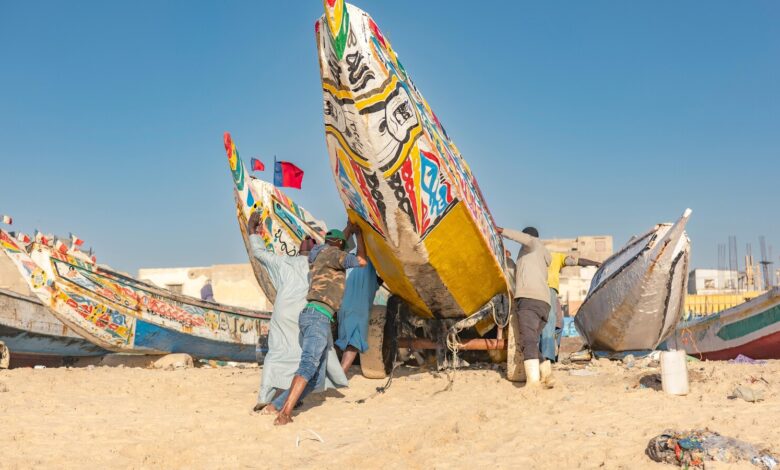A new natural gas project off Senegal makes fishing communities feel threatened

GUET NDAR, Senegal — One cannot overlook the gas platform situated off the coast of northern Senegal. Its flare stack burns ceaselessly above the rolling breakers.
The natural gas project, a collaboration between British energy leader BP and U.S.-based Kosmos Energy, commenced operations on the final day of 2024. It aims to provide employment opportunities to the densely populated fishing community of Guet Ndar, located just outside the former colonial capital of Saint Louis.
The gas extraction plant, the deepest in Africa, is designed to help revitalize Senegal’s stagnant economy following the discovery of oil and gas reserves off the country’s coastline just over a decade ago. The first offshore oil project also commenced last year.
Mariam Sow, one of the few remaining vendors in the once-thriving fish market, recounted that the decline started in 2020 when the platform began emerging from the sea.
“This market used to be bustling every day,” Sow lamented, pointing to the desolate lot. The nearby beach is now lined with hundreds of idle boats.
Fishing is a cornerstone of life in coastal Senegal, employing over 600,000 individuals, as per the U.S. Department of Agriculture. The country exported nearly half a billion dollars worth of fish in 2022, as reported by think tank Chatham House, citing international trade figures.
The Grand Tortue Ahmeyim project is set to extract gas from Senegal and neighboring Mauritania. BP estimates that the field could yield 2.3 million tons of liquefied natural gas annually.
In the previous year, Senegal elected President Bassirou Diomaye Faye, who campaigned on an anti-establishment platform. He vowed to optimize the country’s natural resources by revising what he deemed unfair deals with foreign companies and distributing revenues to the populace.
“I will initiate the disclosure of the actual ownership of extractive firms (and) conduct an audit of the mining, oil, and gas sector,” he declared in his inaugural speech. It remains unclear if renegotiation efforts have commenced, or if they will encompass the gas project.
The fishermen of Guet Ndar assert that the promised benefits from both the project and Senegal’s government have not materialized. The cost of living remains high, and the price of natural gas, a primary cooking fuel in Senegal, continues to escalate. Lower gas prices were a major selling point for the gas project.
Mohamed Sow, a store owner in Dakar, shared that his customers are dismayed by the increase in price of a 12-liter gas canister from 5,000 CFA ($8.50) to 8,000 CFA ($13.80) in recent years.
“Continuously raising the price is unsustainable,” he remarked.
Senegal’s government did not respond to requests for comments.
The fishing community near the project has observed additional signs of distress.
Shortly after the commencement of the gas project’s operations, fishermen reported a plethora of bubbles in the sea. BP attributed this to a temporary gas leak that “did not immediately impact ongoing production activities from the remaining wells.”
It took weeks to rectify the leak. BP did not disclose the quantity of gas — predominantly methane — that leaked into the ocean, or the cause of such an early leak in the new project.
In response to written inquiries, BP stated that “the environmental impact of the release was deemed negligible” given the “low rate” of release.
Conversely, the environmental organization Greenpeace highlighted the significant effects of such spills on the ecosystem.
“The GTA field hosts the world’s largest deep-water coral reef, a unique ecosystem. A single spill could eradicate decades of marine biodiversity, pollute food chains, and devastate habitats,” they stated.
Seated by a BP-funded and branded fish refrigeration unit intended to foster community relations, Mamadou Sarr, the president of the Saint Louis fishermen’s union, discussed the concerns.
Sarr claimed that fish have become scarcer as they are drawn to the platform and away from several reefs that the people of Guet Ndar have fished for centuries.
Illustrating in the sand, he elucidated how the fish, enticed by the project’s lights and underwater structures, no longer frequent their traditional “homes.” Areas surrounding the platforms are now restricted to fishermen.
Sarr also mentioned that an artificial reef being constructed by BP obstructs ships that routinely visit the structures, further deterring fish.
One fisherman, Abdou, displayed his haul after two days at sea: two insulated boxes brimming with fish, each comparable to an oil drum in size. A box of fish fetches 15,000 CFA, or $26.
He recounted that prior to the gas project, he would return with four or five boxes per two-day excursion. Now, acquiring two is considered a success.
This exacerbates an issue exacerbated by overfishing by foreign vessels.
BP emphasized that discussions with community members regarding such matters are ongoing, and highlighted community-focused initiatives such as microfinance and vocational training programs in the region.
Sarr contended that despite assurances, the government overlooked his community when consenting to the gas project.
“This is our land and sea, why are we excluded from the decision-making process?” he queried.
He and others found it ironic that the refrigeration unit next to them remains inaccessible. The key, Sarr mentioned, is “somewhere in Dakar,” and locals asserted they have never glimpsed inside it.
___
For additional insights on Africa and development: https://apnews.com/hub/africa-pulse
The Associated Press receives financial support for global health and development coverage in Africa from the Gates Foundation. The AP is solely responsible for all content. Find AP’s standards for working with philanthropies, a list of supporters and funded coverage areas at AP.org.





